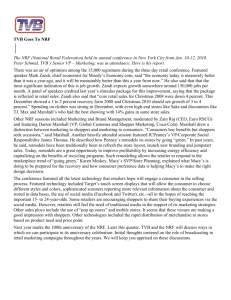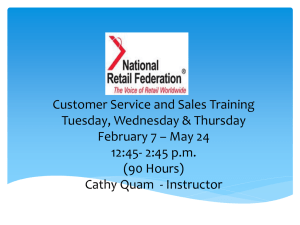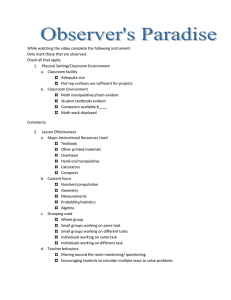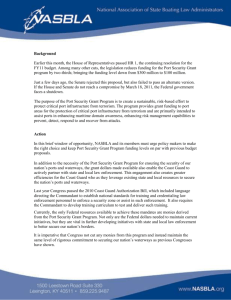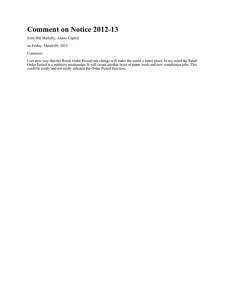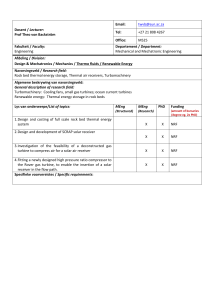February 2, 2016 Mr. Harold Daggett Mr. David Adam
advertisement
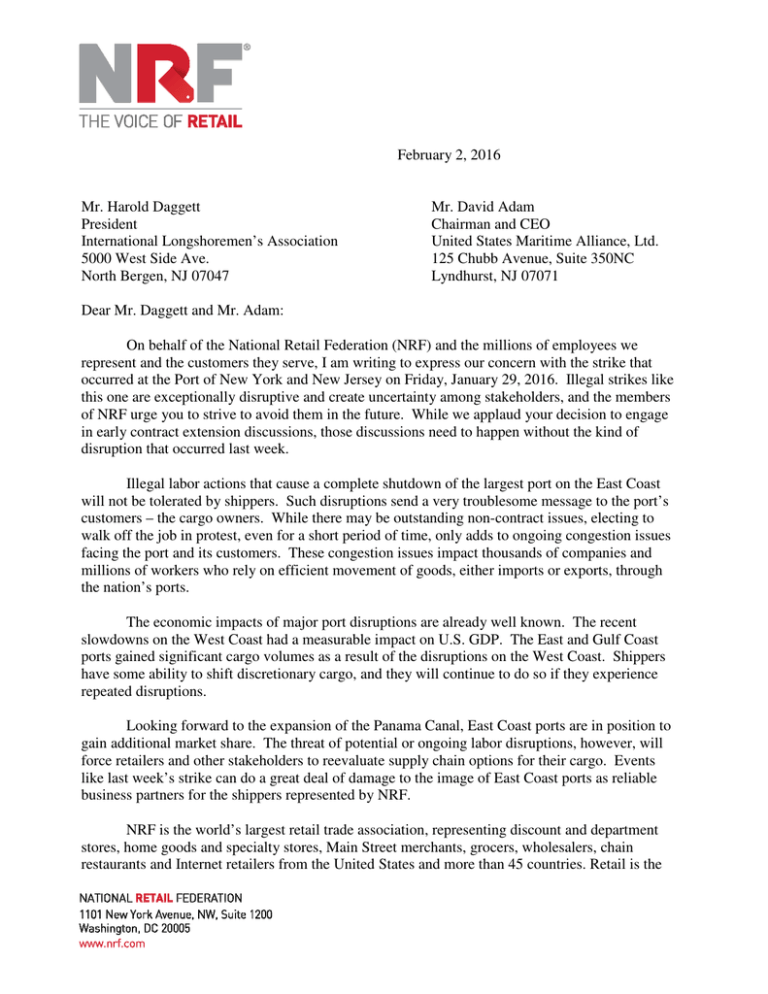
February 2, 2016 Mr. Harold Daggett President International Longshoremen’s Association 5000 West Side Ave. North Bergen, NJ 07047 Mr. David Adam Chairman and CEO United States Maritime Alliance, Ltd. 125 Chubb Avenue, Suite 350NC Lyndhurst, NJ 07071 Dear Mr. Daggett and Mr. Adam: On behalf of the National Retail Federation (NRF) and the millions of employees we represent and the customers they serve, I am writing to express our concern with the strike that occurred at the Port of New York and New Jersey on Friday, January 29, 2016. Illegal strikes like this one are exceptionally disruptive and create uncertainty among stakeholders, and the members of NRF urge you to strive to avoid them in the future. While we applaud your decision to engage in early contract extension discussions, those discussions need to happen without the kind of disruption that occurred last week. Illegal labor actions that cause a complete shutdown of the largest port on the East Coast will not be tolerated by shippers. Such disruptions send a very troublesome message to the port’s customers – the cargo owners. While there may be outstanding non-contract issues, electing to walk off the job in protest, even for a short period of time, only adds to ongoing congestion issues facing the port and its customers. These congestion issues impact thousands of companies and millions of workers who rely on efficient movement of goods, either imports or exports, through the nation’s ports. The economic impacts of major port disruptions are already well known. The recent slowdowns on the West Coast had a measurable impact on U.S. GDP. The East and Gulf Coast ports gained significant cargo volumes as a result of the disruptions on the West Coast. Shippers have some ability to shift discretionary cargo, and they will continue to do so if they experience repeated disruptions. Looking forward to the expansion of the Panama Canal, East Coast ports are in position to gain additional market share. The threat of potential or ongoing labor disruptions, however, will force retailers and other stakeholders to reevaluate supply chain options for their cargo. Events like last week’s strike can do a great deal of damage to the image of East Coast ports as reliable business partners for the shippers represented by NRF. NRF is the world’s largest retail trade association, representing discount and department stores, home goods and specialty stores, Main Street merchants, grocers, wholesalers, chain restaurants and Internet retailers from the United States and more than 45 countries. Retail is the National Retail Federation February 2, 2016 Page 2 nation’s largest private sector employer, supporting one in four U.S. jobs – 42 million working Americans. Contributing $2.6 trillion to annual GDP, retail is a daily barometer for the nation’s economy. NRF’s This is Retail campaign highlights the industry’s opportunities for life-long careers, how retailers strengthen communities, and the critical role that retail plays in driving innovation. Again, we call upon the leadership with the ILA and USMX to discuss contract and noncontract issues at the bargaining table without supply chain disruptions. Long-term stability at the East Coast and Gulf Coast ports is essential. We believe early negotiations on the existing contract should be the path forward and hope that solutions to the tough issues, including those not currently in the contract, will be worked out at the bargaining table, and not with short term, illegal strikes. If you have any questions, please contact Jonathan Gold, NRF’s Vice President, Supply Chain and Customs Policy at (202) 626-8193. Thank you for your consideration. Sincerely, Matthew R. Shay President and CEO

